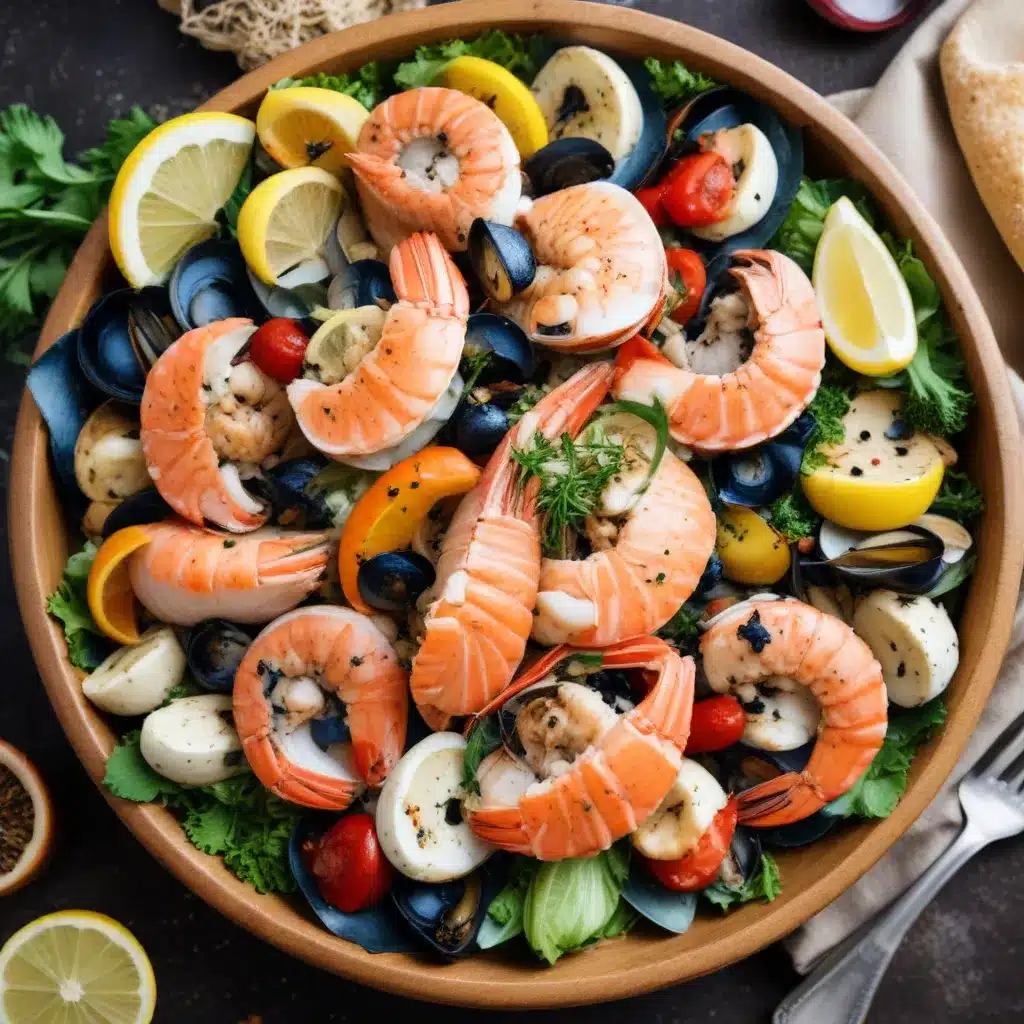
Seafood is a true nutritional powerhouse that deserves a prominent place in our diets. As a seafood dining expert, I’m here to share why incorporating more fish, shellfish, and other ocean-derived foods can elevate your health and wellness. From the heart-healthy properties of omega-3 fatty acids to the brain-boosting benefits of lean protein, the evidence is clear – seafood should be a dietary staple.
The Nutritional Powerhouse of Seafood
When it comes to nutrient density, few foods can rival the impressive profile of seafood. Finfish like cod, salmon, tuna, and halibut are brimming with high-quality protein, essential vitamins and minerals, and those coveted omega-3s. Meanwhile, shellfish such as oysters, mussels, and shrimp provide a treasure trove of bioavailable zinc, iron, and selenium – important for immune function, cognitive health, and beyond.
The versatility of seafood also makes it an excellent dietary staple. Whether you opt for a succulent seared tuna steak, zesty ceviche, or comforting fish chowder, the culinary possibilities are endless. And for those seeking gluten-free options, seafood shines as a naturally wheat-free protein source that can be prepared in a myriad of innovative ways.
The Variety of Seafood Options
The ocean’s bounty offers an incredible array of seafood to explore, each with its own unique flavor profile and nutrient composition. For those partial to finfish, the options range from the mild, flaky cod to the rich, oily salmon – and everything in between. Shellfish enthusiasts can indulge in briny oysters, sweet shrimp, or meaty scallops, to name just a few.
When it comes to making sustainable seafood choices, look for options certified by reputable organizations like the Marine Stewardship Council (MSC) or Aquaculture Stewardship Council (ASC). These seals of approval indicate the seafood was harvested or farmed in an environmentally responsible manner, supporting the long-term health of our oceans.
The Heart-Healthy Properties of Seafood
One of the most well-documented benefits of seafood consumption is its positive impact on cardiovascular health. The high concentration of omega-3 fatty acids, such as EPA and DHA, found in many fish and shellfish varieties has been shown to reduce triglyceride levels, lower blood pressure, and decrease the risk of heart attack and stroke.
Seafood’s lean protein content also makes it an excellent choice for those seeking to maintain a healthy weight and support overall cardiovascular function. Unlike fatty red meats, seafood provides a satisfying source of protein without the saturated fat that can contribute to heart disease.
The Brain-Boosting Benefits of Seafood
In addition to its heart-healthy properties, seafood has also been lauded for its ability to enhance cognitive function and protect neurological health. The omega-3 fatty acids found in fish are crucial for brain development, particularly during early childhood, and have been linked to improved memory, focus, and problem-solving skills.
Furthermore, research suggests that regularly incorporating seafood into one’s diet may help stave off age-related cognitive decline, potentially reducing the risk of Alzheimer’s disease and other forms of dementia. The anti-inflammatory compounds present in many seafood varieties may also play a role in preserving neurological function over time.
The Immune-Strengthening Effects of Seafood
Seafood’s impressive nutrient profile also extends to its ability to support a robust immune system. Shellfish, in particular, are rich in zinc, a mineral essential for the proper functioning of immune cells. Meanwhile, the antioxidant and anti-inflammatory properties of omega-3s and other bioactive compounds found in seafood can help reduce inflammation and enhance the body’s natural defenses against illness.
By incorporating a variety of seafood into your diet, you can give your immune system a powerful boost, arming it with the resources it needs to fend off infections and maintain overall health.
The Gut-Friendly Advantages of Seafood
The gut-friendly benefits of seafood are another compelling reason to make it a dietary staple. Many seafood varieties, such as oysters and mussels, contain natural prebiotics that nourish the beneficial bacteria in your gut. Additionally, the high-quality protein found in seafood can support healthy digestion and reduce the risk of gastrointestinal disorders.
For those seeking to optimize their gut health, seafood presents a fantastic opportunity to diversify your diet and introduce a wide range of essential nutrients that can promote a thriving microbiome.
The Skin-Nourishing Qualities of Seafood
The benefits of seafood extend beyond internal health, as it can also work wonders for the skin. The collagen-boosting properties of many seafood varieties, including salmon and cod, can help maintain skin elasticity and plumpness, while the anti-inflammatory compounds found in omega-3s can reduce redness and acne.
By incorporating seafood into your diet, you can give your skin a radiant, youthful glow from the inside out, without the need for expensive topical treatments.
The Environmental Impact of Seafood Consumption
As we consider the many health advantages of seafood, it’s important to also acknowledge the environmental impact of our seafood choices. By opting for sustainably-sourced wild-caught or responsibly farmed seafood, we can enjoy the nutritional benefits while also supporting the long-term health of our oceans and the marine ecosystems that depend on them.
Look for seafood certified by organizations like the MSC or ASC, which ensure fishing and aquaculture practices are environmentally sound. This not only reduces your carbon footprint but also helps safeguard the future availability of the seafood we all love.
In conclusion, the case for incorporating more seafood into your diet is compelling. From heart health and brain function to immune support and skin nourishment, the wealth of evidence speaks for itself. By making seafood a dietary staple, you can unlock a world of culinary possibilities while simultaneously elevating your overall well-being. So the next time you’re planning a meal, be sure to cast your line in the direction of the ocean’s bounty – your body and the planet will thank you.

